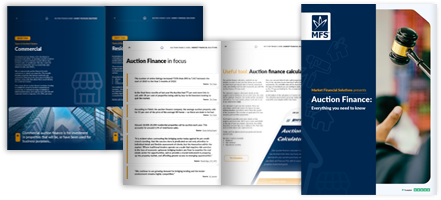Market Financial Solutions are a bridging loan and buy-to-let mortgage provider and are not legal, financial, investment or tax advisers. This document is for informational purposes only and does not, and should not be considered, to constitute legal, financial, investment or tax advice or be relied upon by any person to make a legal, financial, investment or tax decision. Therefore, Investors are encouraged to seek appropriate professional advice. The information in this content is correct at time of writing.

Buying commercial property at auction may be a sound strategic choice for property investors. The commercial property market has struggled in recent years, and may not be on the radar for many buyers.
But, some of these investors may end up missing out. The UK commercial scene is recovering better than many may expect. Certain assets – such as shopping centres, offices, and retail warehouses[1] – have performed particularly well in more recent months.
For those who notice these shifts and plan to get in on the action, auctions may prove useful. Properties can be secured at auctions at low prices, allowing for quick turnarounds, and flipping strategies.
Fortunately, when it comes to buying commercial property at auction, bidders are spoilt for choice. Many auction houses across the UK, such as Auction House London[2], offer both residential and commercial auctions. There are also more specialist firms, such as acuitus[3], that solely offer commercial lots.
Property types wise, bidders also have access to a broad range of opportunities. There are the typical options available, such as offices and retail hubs[4]. But, more niche options, such as mixed-use[5] or even commercial land, can also be found.
Who Can Bid, and How Can They Do It?
The auction world is generally open to many kinds of investors and entities. While each auction house will have its own rules and preferences on this, generally, it’s possible to bid as an individual, and via a company[6]. At Market Financial Solutions, our auction finance is available for individuals, limited companies, LLPs, SPVs, offshore companies, and more.
While a broad spectrum of investors can engage with the auction world, there are also many ways in which they can do the actual bidding. Broadly there are two main types or categories of auction – the traditional method, and the modern method[7].
Traditional auctions are likely what investors picture in their heads when they think of bidding. They’re typically held in person at an auction house. All interested bidders will be in attendance and making their bids on a property in front of each other. The highest bidder wins, a deposit is paid (usually 10% of the purchase price), and everything needs to be wrapped up within 28 days.
Modern auctions can offer a bit more flexibility. They’re held online, and the auctions themselves can last for several weeks. The highest bidder wins, but they can have around two months to complete the process.
Other Bidding Options for Investors:
- Dutch auctions: Here, auctioneers will start the bidding at a high price – too high for most. Incrementally, the auctioneer will lower the price until someone bids. There is usually only one bid for each lot, and the first person to bid wins
- Blind auctions: In blind bidding, the number of winners will typically be determined by the “available quantity” of the assets involved. If there are 15 items up for sale – the top 15 bidders will be the winners. In a blind auction, the bidding history is hidden. Bidders will be told if they’re winning and if they’re not, they’ll have to enter a higher bid or give up on the lot
- Foreclosure auctions: Auctions that solely offer repossessed properties. As repossessed properties come under the ownership of a bank or other institution, they can be put up for auction in an attempt to cover some of the costs and/or losses. This may allow bidders to secure a bargain

What to Be Aware of About the Auction Industry
There are many advantages to buying commercial property at auction. Those who want to move quickly could do so in the auction scene, where winning bids must be wrapped up within days. This can allow investors to jump on a regional or sector-specific opportunity before it’s too late.
They may also be able to move quickly on a great price. The properties that turn up at auction houses are often vacant, depilated, and/or run down. The owners will probably want to sell them quickly and as such, they may lower the price dramatically. This could bode well for those who want to engage with a refurbishment or conversion strategy.
The transparency of bidding may also provide peace of mind. In a typical auction, investors will be able to see all the other bids for the commercial property at hand. As such, there will be no risk of gazumping or being caught by surprise.
Ahead of all this though, investors need to be aware of the potential pitfalls. There is no guarantee that they’ll secure the property they’re after. Also, if it’s a particularly popular asset, the price could be raised to uncomfortable levels as competition ramps up.
The speed of the bidding world can also catch many off guard if they’re not prepared. Having just 28 days to complete a purchase can add pressure and if the deadline is missed, bidders risk losing their deposit and the property itself.
To avoid being hit by these risks, commercial property bidders will want to ensure they have the right form of finance behind them. This may prove to be easier said than done, however.
The Finance Needed for Buying Commercial Property at Auction
Ahead of any auction purchase, investors will want to make sure they’re as prepared as possible. this will, at a minimum, involve researching the property they want to bid on, understanding the ins-and-outs of the auction house they’re going to, and having their finances in order.
The latter may be particularly tricky. Given how quickly auctions can move, it may be difficult to attain finance within the tight timeframes involved. Difficult in the mainstream lending market, that is.
While it is possible to get a mortgage for an auction purchase[8], doing so for a commercial property likely won’t be easy. Commercial mortgages are deemed to be high risk by many lenders[9]. As such, they’ll be subject to tougher lending criteria, and higher costs when compared to residential deals.
When buying commercial property at auction, investors are much more likely to have a smoother time with bespoke financial options. At Market Financial Solutions, our auction bridging loans are designed from the ground up to accommodate the auction world. They can be delivered in as little as three days to match the tight deadlines involved, and remain flexible as long-term options are found.
Auction demand shows few signs of slowing down[10]. As more investors turn to bidding to secure their residential and commercial opportunities, we’ll be there to make sure everything’s wrapped up nicely.
The Complete Guide to
Auction Finance
A simple guide to advance your portfolio
- Comprehensive overview
- Auction finance types
- Useful tools
- Industry stats & more
[1] https://www.savills.co.uk/research_articles/229130/363244-0
[2] https://auctionhouselondon.co.uk/
[3] https://www.acuitus.co.uk/
[4] https://www.auctionhouse.co.uk/commercial
[5] https://www.sdlauctions.co.uk/property-auctions/commercial-property-auctions-london/#:~:text=Whether%20you’re%20searching%20for,running%20of%20any%20open%20projects
[6] https://www.auctionhouse.co.uk/guide/buy-under-a-company-name#:~:text=You%20will%20also%20need%20to,may%20include%20electronic%20ID%20verification
[7] https://www.zoopla.co.uk/discover/buying/8-step-guide-to-buying-a-property-at-auction/
[8] https://www.sdlauctions.co.uk/latest-news/can-you-mortgage-an-auction-property/
[9] https://www.commercialtrust.co.uk/news/commercial-and-residential-mortgages/#:~:text=Due%20to%20the%20higher%20risk,missed%20payments%20for%20the%20lender
[10] https://www.estateagenttoday.co.uk/features/2024/5/q1-at-auction-the-most-active-auction-market-weve-seen-to-date





